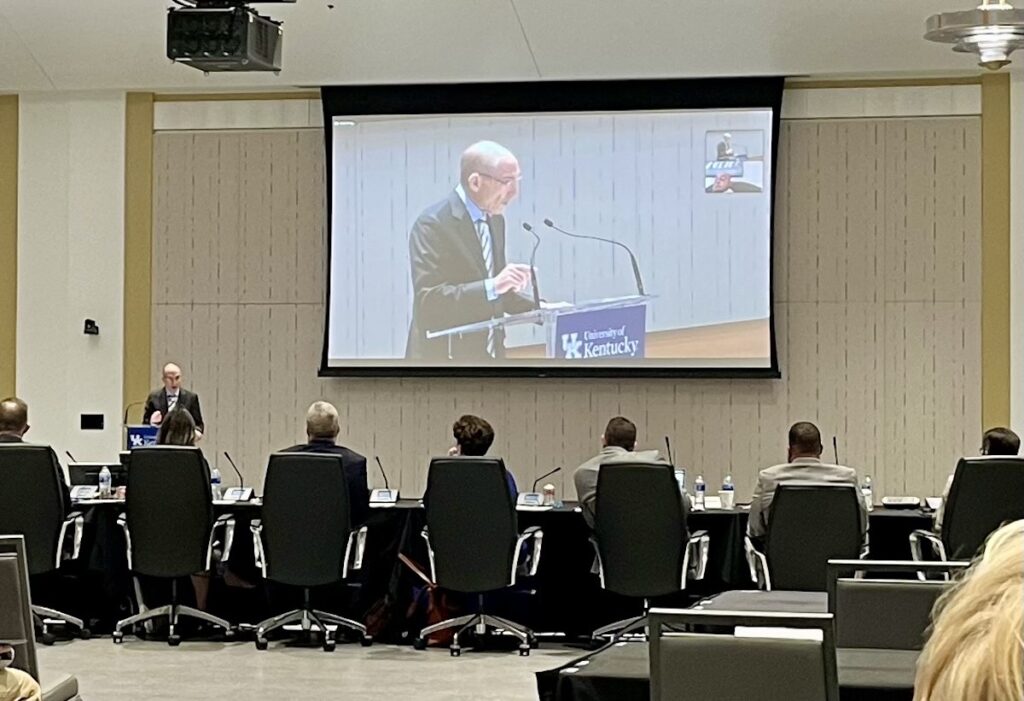LEXINGTON, Ky. — The University of Kentucky Board of Trustees voted Friday in favor of changing how the institution is governed, paving the way for faculty to lose decision-making power over academic decisions.
The 19-1 vote in favor of a proposal from President Eli Capilouto means Kentucky’s flagship university will transition its University Senate — a group made up of faculty, staff and student representatives — into a faculty senate. Capilouto has called the changes a way to streamline UK’s governance processes.

This vote came despite a failed attempt by faculty trustee Hollie Swanson to table the proposal. No one seconded her motion, and it therefore failed without reaching a vote.
The board will take feedback from various campus stakeholders before giving final review to the proposal at its June meeting. Under the new shared governance model, faculty, staff and student representatives would largely have an advisory role. Now, the University Senate “determines broad academic policies” for UK.
Ahead of Friday’s meeting, the University Senate passed a resolution saying the Senate had “no confidence” that Capilouto’s proposals “are in the best long-term interests of the University or the Commonwealth.” However, the Student Government Association and the Staff Senate passed their own resolutions backing the changes.
Capilouto told the board Friday that staff members sometimes “feel like second class citizens.” They are “often made to feel less than … faculty,” he said.
“It shouldn’t be that way, particularly when so many of our people have so much to offer,” he said. “We must do better; we can do better.”
Several people who spoke against his proposal specifically questioned the timing of the change.
Capilouto addressed that, saying: “Why not now? I believe this is the right time to make a sustainable change.”
“I know change is uncomfortable,” Capilouto said. “It’s why we call it growing pains.”
Who testified for and against the proposal?
During Friday’s trustees meeting, more than a dozen people came forward to speak both in favor and against the move. Fourteen requested to speak, and all were approved. An additional two people requested to speak after the deadline passed, a UK spokesman said.
The audience for the board meeting was packed into the Harris ballroom in UK’s Gatton Student Center. An estimated 190 were in attendance.
Karen Petrone, a College of Arts professor, said the move “threatens the national reputation” UK holds. She slammed the final details of the proposal becoming public a week before the vote and said the board is “rushing … radical change” that is “undemocratic” and a “catastrophic mistake.”
“Acceleration without clear direction can lead to serious and costly missteps,” said Petrone. What’s being proposed, she said, is “the opposite of shared governance.”
“Why,” she asked, “is the university in such a rush?”
Petrone also said she’s “very glad to see the gesture toward inclusion of all parts of the university in deliberations of important matters.”
But, she said, the “gesture is an empty one.”
“Too much power is concentrated in the hands of the president,” she said. “A future leader could abuse the power.”
Ben Braun, a math professor and member of the United Campus Workers, said the move will “weaken the bonds of collaboration and engagement that have allowed UK to flourish and thrive.” It will also, he said, “cause lasting harm, both of the reputation and the quality of our university.”
Lauren Cagle, a College of Arts associate professor, also criticized what she said was a “rushed” vote that left her “horrified.”
Bob Grossman, a chemistry professor, said the move was “bad for UK” and “bad for Kentucky.” He further called the move a “power grab.”
Several spoke in favor of the move, including Chipper Griffith. The professor and College of Medicine Dean said the move will “elevate the voices of students” as well as the voices of staff.
Rudy Buchheit, the college of Engineering Dean, also spoke in favor.
“The power of the faculty must be directed with great intentionality,” he said. It should not be “overly burdened” with “routine matters” or those of “narrow or local interest.”
The board discussion
Trustee Swanson, the lone no vote Friday, called the proposal “ill-conceived, poorly justified” and “rushed.”
“I asked my board members (if) the silencing the voices of paradigm shifters, creators, thought leaders and innovators is the best approach for shaping our future citizens of the Commonwealth? My answer is no.”
Faculty trustee Hubie Ballard said it’s important for students and staff to have “appropriate input to all matters important to the university.”
Going forward, said Ballard, it’s important that there is “more collaboration from all sides in terms of moving this forward so that everyone has an equal voice.”
Chairman Britt Brockman praised the president’s proposal and the process of bringing it to the board.
“The bottom line is that … too many members of our community, particularly students and staff and those at the local unit level, don’t feel as though they have a voice,” said Brockman. “They don’t see themselves as having a seat at the table and the decisions that are made about the university.”
“We can’t turn a blind eye to what we’ve learned,” he said. “We can’t ignore what we have heard so many committed members of our community, students, staff, college leaders, and yes, many faculty.”
This article is republished under a Creative Commons license from Kentucky Lantern, which is part of States Newsroom, a network of news bureaus supported by grants and a coalition of donors as a 501c(3) public charity. Kentucky Lantern maintains editorial independence. Contact Editor Jamie Lucke for questions: info@kentuckylantern.com. Follow Kentucky Lantern on Facebook and Twitter.
Sarah Ladd is a Louisville-based journalist and Kentuckian. She has covered everything from crime to higher education. In 2020, she started reporting on the COVID-19 pandemic and has covered health ever since.
McKenna Horsley covers state politics for the Kentucky Lantern. She previously worked for newspapers in Huntington, West Virginia, and Frankfort, Kentucky. She is from northeastern Kentucky.







